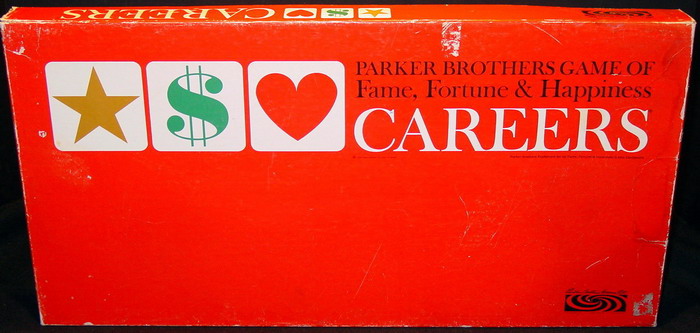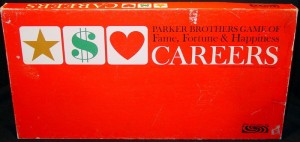by Beth Olson
Many of us—of any age—recall playing the board game Careers in one of its many versions. The goal is to obtain points in three areas—fame, fortune, and happiness. Players determine their own proportions of each for their individual “success formulas” at the beginning of the game.
In our real-life careers, these proportions are constantly changing as our priorities shift. To complicate matters, our very definitions of these goals also change. My current definition of “happiness” may bear some resemblance to what it did when I was fresh out of college, but it is also quite different now. All of which means that identifying desired career fields and searching for job opportunities within them is an ongoing and changing process throughout our lives—whether we are 24 or 48.
Game buffs might already know this, but this board game included an innovation unusual for its time. The game Careers—as in real life—has more than one objective. (See Larry Levy’s article from Counter magazine.) As we proceed down our individual post-graduation roads, our lives become more complicated and diverge from any preconceived “norm.” As our objectives change and multiply, who we are and how we describe ourselves also changes.
Not only do we change, but the landscape changes around us. There is not a single path or right answer to our pressing career and job-search questions. When we seek our next job, we must reacquaint ourselves with the expectations of our hoped-for employers, and we must reacquaint ourselves with the job-search process itself.
If you are a recent graduate seeking a second job in your current career field, you know what it took to find your first job. You are already familiar with the steps that may lead to job-search success: how to network, with whom, where, how to introduce yourself, resume formats, Facebook and LinkedIn profiles, interview protocol.
Alumni who are looking for a job in a different field will need to research all these steps. How are jobs advertised in this field? Are they advertised or shared by word of mouth? What are the strongest professional associations in this field? What is the industry “lingo” for the skills needed in this new profession? How should you format your resume?
And alumni who are returning to the job market after many years will find that the job-search process itself has changed. Resumes in our fast-paced world should be focused and streamlined. Social media play a major role in the game now, and online profiles may be as important as resumes. Employers will often not respond to your online application (due to the sheer volume of online applications). Being focused on what you want next is at least (if not more) important than what you’ve done.
Career Services has many resources and suggestions for students in their initial job searches, and much of this information is applicable to alumni. Review the information on our website at: http://www.vpul.upenn.edu/careerservices/alumni/. This page includes articles on
- Job Search Tips for Alumni
- Resume Tips for Alumni
- Strategies for Career Change
- Work-Life Balance Issues
Remember that you’re the expert on explaining who you are. If you’re staying in your current field, you’re an expert on that field as well and have access to information, people, and resources specific to your field (and perhaps more applicable than the broad range of general resources at the Career Center).
Networking is still the name of the game, and you are better situated to do this now than when you were a new graduate or just entering the workforce. As a graduate of Penn, you have the benefit of access to other Penn alumni—a great way to learn about different career fields, meet people, and explore options.
- Penn Alumni Career Network (PACNet)—a database of Penn Alumni who have volunteered to be contacted with career-related questions
- Penn Alumni Clubs
- Penn Alumnni Group on LinkedIn—tens of thousands of Penn alumni and sub-groups by specific industry
Some job-search skills are the same for anyone—students, alumni with experience, alumni reentering the job market. Critical strategies for all include thoroughly researching and understanding the career field of interest to you; networking with people in that industry; being able to articulate what you want in a focused and concise statement; creating tailored documents (resumes and cover letters). There are strategy resources at http://www.vpul.upenn.edu/careerservices/undergrad/findingjobs.html and job postings at http://www.vpul.upenn.edu/careerservices/pennlink_jobseekers.html.
Just like students who don’t yet know what they want to do, alumni in transition who haven’t identified a career field and are still determining what they want to do next should focus on career exploration. Check out the tips at http://www.vpul.upenn.edu/careerservices/discovery/ and begin your research to determine what type of job/career field you’re seeking.
Regardless of where you are at in your career game and what your “success formula” is, Career Services has resources to help you in your job-search process.



